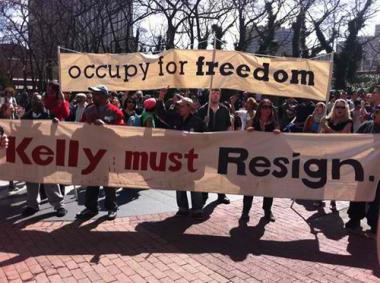
The uneasy relationship between Occupy Wall Street and electoral politics has always been one of the greatest distinguishing factors for our burgeoning movement.
Likewise, in the leadup to the 2012 elections, Occupy Public Access TV convened a panel with diverse perspectives through a Google Hangout 'On Air' to hold a constructive conversation on this complex topic.
Panelists included artist and agitator Gan Golan who co-founded the 'Tax Dodgers' baseball team and built a 13 foot tall Bane Capital supervillain puppet, activist and photo-journalist Jenna Pope who is a Wisconsin occupier turned NYC transplant, Charles Lenchner from Organizing 2.0 and the OWS Tech Ops working group, musician and organizer Eve Silber who is devoted to OWS alliance building, Occupy supporter Josh Silverstein from DFA NYC, filmmaker Messiah Rhodes from the OWS media working group, and then myself in a facilitating role.
Based on the discussion, it is apparent that there is an overt consensus within Occupy that voting alone is not enough. The collective attitude seems to be that the vast sums of money subverting our democracy are so high that even if a political actor is on our side, we must act to 'make them do it'.
This further comes in the face of even strong disagreements as to whether Occupy should support voting at all, bespeaking an even more ardent resistance to entering politics in a manner where an Occupy voice is expressed in any sort of partisan way.
Controversial arguments were made in this context about getting much more involved in the policy battles of local politics in particular. The reasoning entailed that, in contrast to electioneering for its own sake, occupiers could create power for our communities if we show that we are able to achieve tangible victories that successfully serve the 99%.
From my personal perspective, the sentiments expressed paralleled those during the Netroots Nation panel I had the pleasure of joining in the immediate aftermath of the Wi$con$in recalls. That was a cathartic experience to say the least, as it was an opportunity to speak with a popular uprising largely feeling like it had just been sold out by electoral politics after putting its all into the process.
Yet then and now some of the most exciting models from the movement can be seen in how these occupation-inspired horizontal and leader-full efforts are acting as touchstone points of innovation at the most hyper-local of levels. Technology and our peer networks are enabling incomparably more direct forms of democracy, allowing us to aid and engage our neighbors in game-changing ways.
As depicted by JA Myerson, the core of Occupy can best be approximated by the popular chant that “another world is possible.” And this broader cultural framework displays why occupiers are organizing to build this better world in ways that far exceed the ballot box.
The heroic Occupy Sandy effort to directly provide relief in the wake of the hurricane devastation is a particularly poignant example. It couldn't have come at a more perfect time either -- exposing the disastrous effects of our #Democracy4Sale while it so clearly reigns down upon us.
But make no mistake about it: although Occupy is above our bought and paid for electoral system, you better believe it impacts it. Watch the Hangout to hear how.
Originally published in Daily Kos

